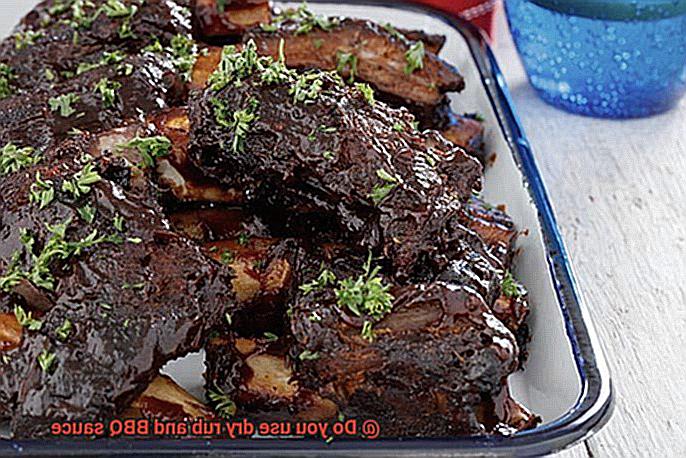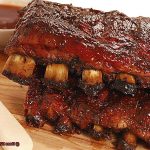Are you a grill master searching for the next big thing to take your barbecued meats to new heights of deliciousness? Or are you new to the outdoor cooking scene, still learning about rubbing, marinating, and smoking? Regardless of where you fall on the spectrum, one question is bound to arise: do you use dry rub and BBQ sauce?
Some pitmasters swear by dry rubs – a mix of spices and herbs like garlic powder, paprika, and cumin that are applied directly onto the meat before cooking. Others wouldn’t even think about grilling without slathering on a generous coat of BBQ sauce – a sweet and tangy glaze that coats the meat during the final stages of cooking.
So which reigns supreme: dry rub or BBQ sauce? Both have their pros and cons, with personal taste, meat type, and cooking method all playing key roles in determining which is best. In this post, we’ll dive deeper into the advantages and disadvantages of both dry rubs and BBQ sauces while providing tips and tricks for using each to achieve mouthwatering results. Prepare to fire up your grill as we explore the world of dry rubs and BBQ sauces – your taste buds won’t be disappointed.
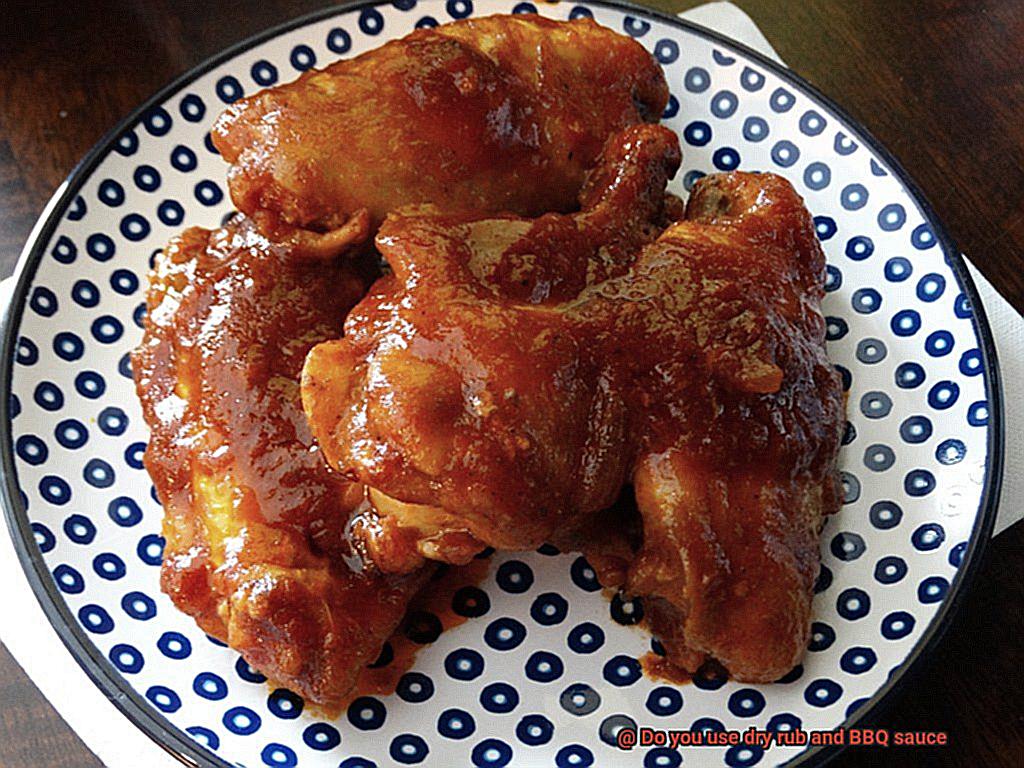
Contents
What is a Dry Rub?
A dry rub is a blend of spices, herbs, and seasonings that are applied to meats before cooking. This technique adds depth and complexity to the meat without the use of any liquid ingredients, making it an ideal choice for grilling or smoking. Dry rubs can be used on a variety of meats, including succulent ribs, tender brisket, juicy chicken, pork, and even vegetables or tofu.
Making a dry rub is simple. Just combine a mixture of salt, pepper, garlic powder, onion powder, paprika, and other spices depending on the desired flavor profile. You can purchase pre-made dry rubs at grocery stores or create your own at home with a variety of ingredients that suit your taste buds.
One of the benefits of using a dry rub is that it creates a mouth-watering crust on the meat when cooked. The combination of spices and seasonings creates a delicious outer layer that enhances the natural flavors of the meat. It also allows for personalization to meet individual taste preferences by adjusting the amount of certain spices.
Now, what about BBQ sauce? Should you use it in conjunction with a dry rub or separately? The answer largely depends on personal preference and the type of meat being grilled.
For instance, if you’re grilling a steak, you may want to use just a dry rub to highlight the natural flavors of the meat. On the other hand, if you’re preparing chicken wings or pork ribs, using both a dry rub and BBQ sauce can create an added layer of complexity and flavor.
It’s essential to note that some BBQ sauces already contain seasoning blends similar to dry rubs. In this case, using both may be too overwhelming and unnecessary.
What is BBQ Sauce?
Get ready to have your taste buds tantalized because we’re about to dive into the delicious world of BBQ sauce. If you’re a grill master, then you know that BBQ sauce is not just a condiment, but an essential ingredient in creating mouth-watering barbecue dishes.
BBQ sauce is a thick and decadent sauce that adds a bold punch of flavor to grilled meats. It’s the perfect marinade, glaze, or dipping sauce and comes in various varieties with varying levels of sweetness, spiciness, and acidity. The main ingredients in BBQ sauce include tomato paste or ketchup, vinegar, sugar or molasses, and various spices such as garlic powder, onion powder, paprika, and cumin. These ingredients create a flavor explosion that varies depending on the type of BBQ sauce.
History buffs will be interested to know that the origins of BBQ sauce can be traced back to the early 16th century when Spanish explorers introduced barbecue to the Caribbean. The first recorded use of barbecue sauce was in the late 17th century in Virginia. Since then, BBQ sauce has become a staple of American cuisine and has spread globally.
Each region in the United States has its own unique style of BBQ sauce. Kansas City-style BBQ sauce is sweet and smoky with a thick texture; Memphis-style BBQ sauce is tangy with a hint of heat; Texas-style BBQ sauce is spicy with a strong tomato flavor; and Carolina-style BBQ sauce is tangy and vinegary with a mustard base. But BBQ sauce isn’t just limited to the United States. Countries around the world have their own variations as well. In South Korea, bulgogi sauce is used as a marinade for beef, while in Jamaica, jerk sauce is used to add heat and flavor to grilled chicken.
But how do you use BBQ sauce? The possibilities are endless. You can brush it onto meat during the cooking process to add flavor and moisture. Or you can serve it on the side as a dipping sauce. You can even use it as a marinade or glaze for an extra burst of flavor. When using BBQ sauce as a marinade, it’s best to marinate the meat for several hours before grilling to allow the flavors to penetrate the meat fully. As a glaze, BBQ sauce is brushed onto the meat during the last few minutes of cooking to create a sticky and flavorful coating.
Benefits of Using Dry Rubs and BBQ Sauces
Spice up your grilling game with the dynamic duo of dry rubs and BBQ sauces. As a grilling expert, I can attest to the incredible benefits that these flavorful ingredients bring to any meat dish.
First and foremost, let’s talk about flavor. Dry rubs and BBQ sauces are packed with a variety of herbs, spices, sugars, and salts that create depth and complexity in taste. Whether you prefer sweet or spicy, tangy or savory, there is a flavor profile for everyone to enjoy. Plus, these ingredients add an irresistible aroma that will make your mouth water before the meat even hits your plate.
But the benefits don’t stop there. Dry rubs and BBQ sauces also work wonders in tenderizing meat. The enzymes and acidity found in these ingredients break down tough connective tissues and proteins, resulting in a tender texture that melts in your mouth.
Another advantage of using dry rubs and BBQ sauces is their ability to retain moisture in lean meats like chicken breasts or pork loin. The oils, sugars, and other ingredients help to lock in moisture, ensuring juicy and succulent meat every time.
What’s more, dry rubs and BBQ sauces are versatile and can be used on a wide range of meats, from chicken to beef to pork. They can also be used on vegetables or tofu for a flavorful vegetarian option. With so many flavors and textures to choose from, the possibilities are endless.
Finally, it’s worth mentioning the health benefits of using dry rubs and BBQ sauces. Many of these ingredients contain anti-inflammatory properties that can improve heart health and reduce inflammation in the body. Garlic and turmeric are just two examples of healthy ingredients that can be incorporated into these sauces for added health benefits.
When to Use Dry Rubs vs BBQ Sauces
Let’s start with dry rubs. These magical mixtures of spices, herbs, and sugar create a flavorful crust on the outside of your meats that can’t be achieved with just a sauce alone. If you’re cooking meats like brisket, pork shoulder, or ribs, then a dry rub is your best bet. These cuts of meat benefit from the low and slow cooking method that allows the dry rub to penetrate deeply into the meat for an intense flavor explosion.
On the other hand, BBQ sauces are liquid mixtures of ketchup, vinegar, molasses, and spices that add sweetness and tanginess to your meats. They create a mouth-watering caramelized glaze on the outside of your meat that’s hard to resist. Meats like chicken or pork chops are perfect for BBQ sauce as they benefit from the quick cooking method that allows the sauce to caramelize quickly.
So when should you use a dry rub versus BBQ sauce? It all comes down to personal preference and the type of meat you’re cooking. If you want a more intense flavor profile with a hint of spice or heat, then go for the dry rub. But if you prefer a sweeter or tangier flavor profile or want to create a sticky glaze on your meat, then BBQ sauce is the better option.
But wait. There’s one more factor to consider: cooking method. If you’re cooking your meat low and slow, then a dry rub is ideal as it has time to penetrate deeply into the meat and develop its flavors. However, if you’re grilling your meat quickly over high heat, then using BBQ sauce is better as it won’t have time to burn or become too thick.
Combining Dry Rubs and BBQ Sauces
As an expert in this area, I’m here to share some tips that will help elevate your grilling game.
To start, always apply the dry rub before the BBQ sauce. This will allow the spices to penetrate the meat and infuse it with flavor. Apply your dry rub generously and let it sit for at least an hour or overnight in the refrigerator before adding your BBQ sauce.
When it’s time to add your BBQ sauce, remember that less is more. Start by brushing on a light layer of sauce and add more as needed. Too much sauce can overpower the flavor of the dry rub, so be careful not to use too much. Additionally, wait until your meat is almost fully cooked before applying the sauce to avoid burning.
One crucial tip to keep in mind when combining dry rubs and BBQ sauces is to choose complementary flavors. For example, if you’re using a spicy dry rub, consider pairing it with a sweet BBQ sauce to balance out the heat. Similarly, if you’re using a savory rub, try a tangy vinegar-based BBQ sauce to complement the flavors.
Here are some additional tips for success:
- Experiment with different combinations of dry rubs and BBQ sauces to find your favorite flavor combinations.
- Use quality ingredients for both your dry rub and BBQ sauce for maximum flavor.
- Don’t be afraid to mix things up – try using different types of meat or vegetables with your chosen combination of rubs and sauces.
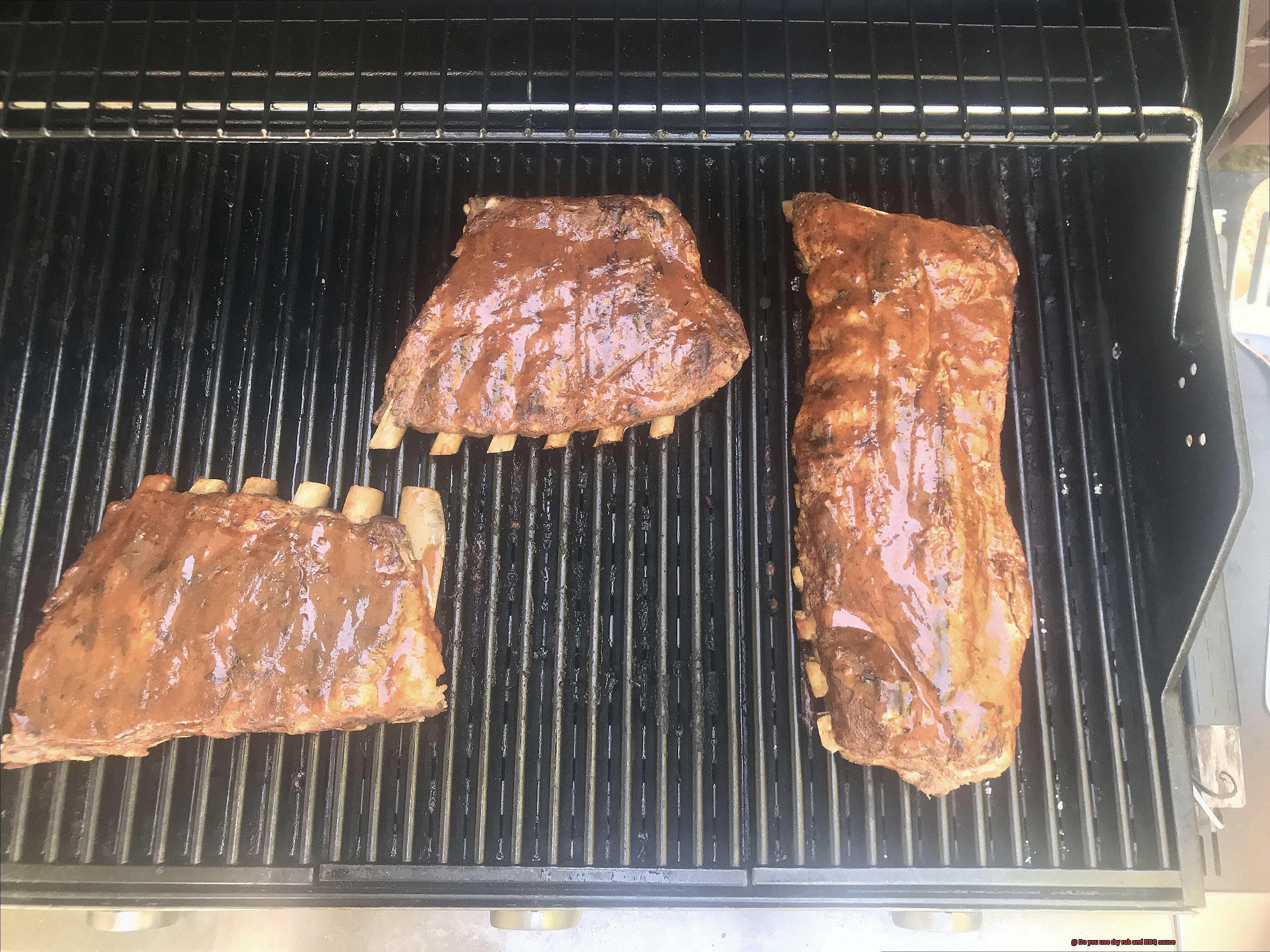
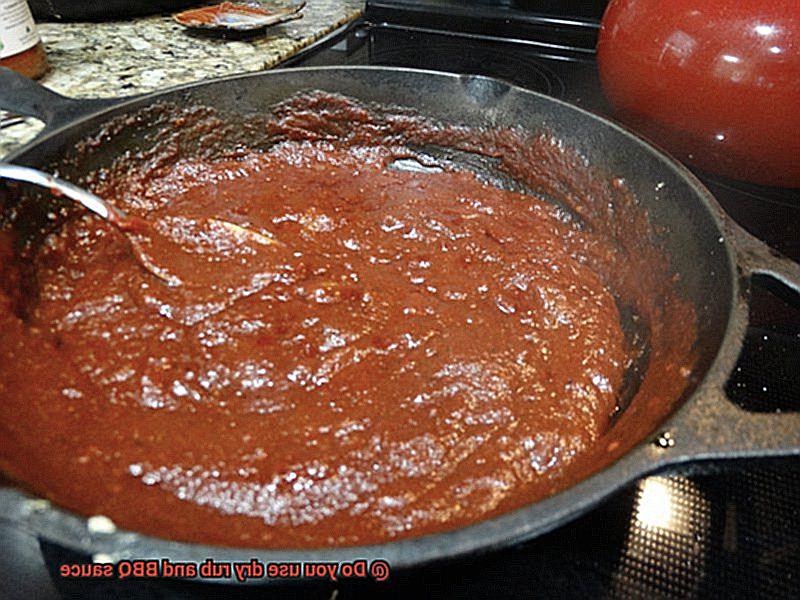
Tips for Applying Dry Rubs and BBQ Sauces
Follow these guidelines to create perfectly seasoned grilled dishes that will impress your taste buds and your guests.
Start with a clean surface
One of the most crucial steps in applying dry rubs and BBQ sauces is starting with a clean surface. Make sure your meat is dry and free of excess fat or skin. This ensures that the rub or sauce will stick better to the meat, enhancing the flavors.
Apply dry rubs generously
Dry rubs are a mixture of spices and seasonings that are directly applied to the meat. To achieve the perfect balance of flavors, apply the rub generously, making sure all sides are coated evenly. Rub it into the meat using firm pressure with your hands, allowing the flavors to penetrate deep into the meat.
Let it rest
After applying the dry rub, let the meat rest for at least 30 minutes before cooking. This helps to create a crust on the outside of the meat while allowing the flavors to meld together. For even more flavor, you can let it sit overnight in the fridge.
Add BBQ sauce towards the end
When it comes to BBQ sauce, timing is everything. To prevent burnt and bitter sauce, add it towards the end of cooking or after grilling. Brush on a thin layer during the last 5-10 minutes of cooking, and add more if desired after removing from heat. This ensures that the natural flavor of the meat isn’t overpowered by too much sauce.
Be mindful of sugar content
Many BBQ sauces contain sugar which can burn easily over high heat. Keep an eye on your grill temperature and consider using a lower heat setting or indirect heat to avoid burnt sauce. Don’t let burnt sauce ruin your perfectly seasoned dish.
Popular Flavor Combinations with Dry Rubs and BBQ Sauces
As grilling season approaches, the search for the perfect flavor combinations with dry rubs and BBQ sauces begins. With endless options available, it can be overwhelming to decide which flavors will elevate your meats to the next level. As an expert on the topic, allow me to guide you through some of the most popular and mouth-watering flavor combinations to satisfy your guests’ taste buds.
First on our list is the classic sweet and smoky combination. A dry rub with brown sugar and paprika paired with a smoky BBQ sauce is a match made in BBQ heaven. This combination is perfect for pork ribs or chicken and is sure to leave your guests craving more. The sweetness of the dry rub balances out the smoky flavor of the BBQ sauce, creating a harmonious blend that will tantalize your taste buds.
If you’re a fan of heat, then the spicy and tangy combination is for you. A dry rub with cayenne pepper or chili powder paired with a tangy BBQ sauce with vinegar or mustard creates a perfect balance of flavors. This combination works wonders on beef or chicken and is guaranteed to spice up any BBQ.
For those seeking something more sophisticated, try the savory and herbaceous combination. A dry rub with garlic and onion powder paired with an herbaceous BBQ sauce with rosemary or thyme is a match made in culinary heaven. This combination works particularly well with lamb or vegetables and will leave your guests impressed by your cooking skills.
Seafood lovers, don’t fret. The citrus and heat combination is a must-try. A dry rub with lemon or lime zest paired with a spicy BBQ sauce featuring habanero or jalapeno peppers creates a bold and refreshing flavor profile that works wonders on fish or shrimp. Your guests will love this unique twist on traditional seafood dishes.
Finally, for those who crave bold flavors, try the bold and smoky combination. A dry rub with espresso or cocoa powder paired with a smoky BBQ sauce creates a rich and complex flavor profile that works well with beef or pork. This combination is sure to impress your guests with its unique and unexpected blend of flavors.
ivBXO4CShn8″ >
Conclusion
After much consideration, it’s clear that the dry rub versus BBQ sauce debate is a matter of personal preference. However, when used correctly, both can elevate your barbecued meats to new levels of deliciousness. Dry rubs are ideal for creating a mouth-watering crust on meat and adding depth without any liquid ingredients. Meanwhile, BBQ sauce is a thick and decadent addition that creates a bold punch of flavor and caramelized glaze on the outside of your meat.
To combine dry rubs and BBQ sauces effectively, choosing complementary flavors is crucial. Experimenting with different combinations while using quality ingredients for both your dry rub and BBQ sauce will ensure maximum flavor. Before applying any seasoning generously, start with a clean surface. Let the meat rest after applying dry rubs before cooking and add BBQ sauce towards the end or after grilling while being mindful of sugar content.
There are popular flavor combinations that work well with specific types of meat. For pork ribs or chicken, try a sweet and smoky combination. Beef or chicken pairs perfectly with spicy and tangy flavors, while savory herbaceous blends complement lamb or vegetables well. Seafood lovers should try citrus and heat combinations, while bold and smoky flavors are perfect for beef or pork.
With these tips in mind, it’s time to fire up your grill and explore the world of dry rubs and BBQ sauces.

